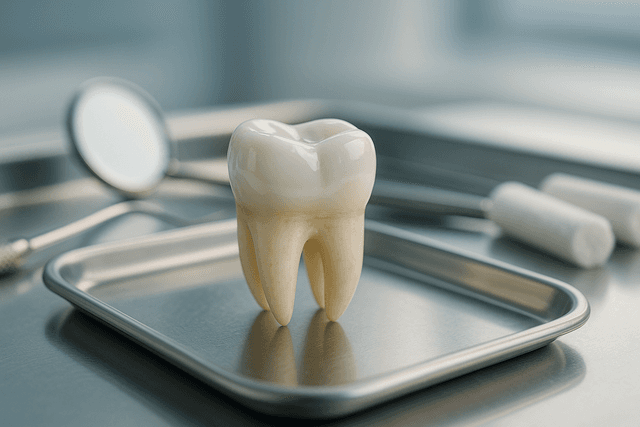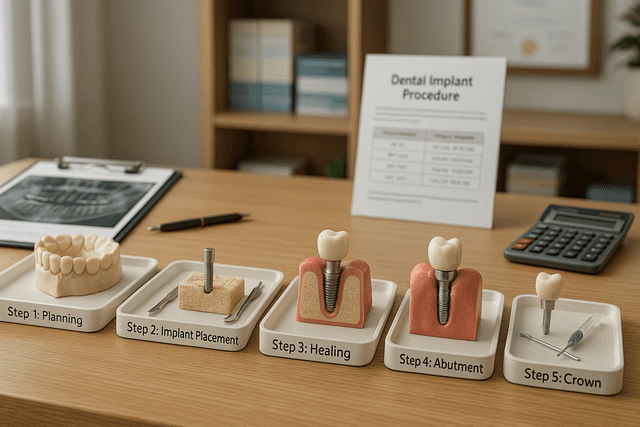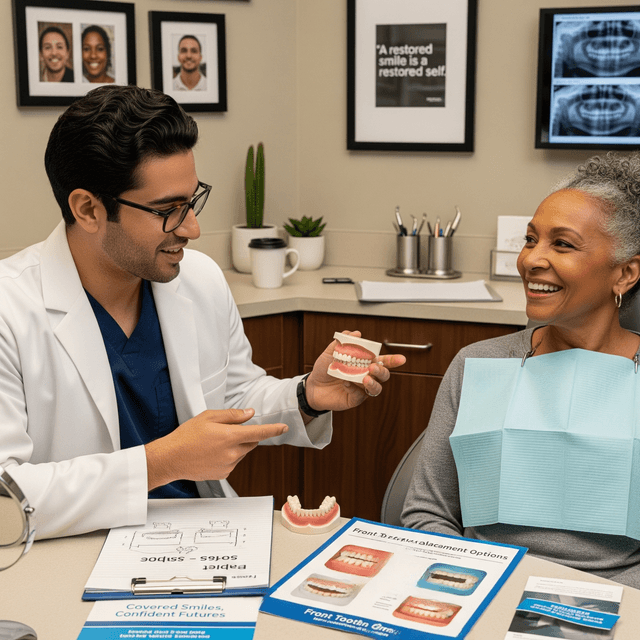Prosthodontics
6 min read
Jun 18, 2025
Can You Get Permanent Dentures at Any Age? What the Experts Say
Thinking about getting a permanent denture but not sure if age is a factor? You’re not alone, and the answer might surprise you. Whether you're dealing with missing teeth in your 30s or considering a more stable solution in your 70s, today’s dental options are more flexible, secure, and natural-looking than ever.

If you’ve ever sat in a dental chair wondering whether it’s “too late” or even “too early” to get a permanent denture, you’re not alone. The good news? You’re probably more eligible than you think. Whether you're 30 and tired of dental issues or 75 and ready to replace missing teeth once and for all, today’s denture options are not one-size-fits-all, and they’re definitely not what your grandparents wore. Let's unpack the facts and put those myths to rest.
Understanding What a Denture Is Today
A denture is simply a custom-made set of artificial teeth designed to replace your original teeth, whether you've lost several teeth or an entire arch. And while traditional dentures are still widely used, permanent dentures have taken center stage for patients looking for something more stable and, frankly, more life-like.
Dentures are a great choice when tooth loss impacts your chewing, speech, or confidence. But don’t think they’re only for seniors. People of all ages wear dentures today, especially if gum disease, injury, or genetics have made natural teeth hard to hold onto.
What Is a Permanent Denture, Exactly?
A permanent denture isn’t some magical set of teeth that you grow into overnight. It’s typically a prosthetic, either full or partial, that’s secured using implants for a more stable, long-term solution. Unlike removable dentures that rest on the gums and might wiggle or shift, permanent dentures are attached to the implants, giving you a secure, like-natural-teeth feel.
Permanent dentures usually rely on dental implants for support. These are small titanium posts placed into the jawbone that act like artificial tooth roots. Once the implants integrate with the jawbone, they can support a full arch or several teeth.
Dental Implant Support Makes the Difference
Here’s where things get smart: instead of gluing down false teeth with adhesive and hoping they stay put through lunch, implants to support dentures mean less movement, fewer worries about slipping, and a bite force that’s closer to what you had with natural teeth.
Permanent denture implants also help prevent bone loss, a common issue with traditional removable dentures. When you lose tooth roots, the jawbone starts to shrink. But implants stimulate the bone, helping maintain your facial structure over time.
Can You Really Get Permanent Dentures at Any Age?
Yes, and here’s why: age alone doesn’t disqualify you. What matters more is the condition of your jawbone, your overall oral health, and your willingness to follow through with proper care and maintenance.
Let’s say you’re in your 30s but have experienced severe tooth loss due to an accident or untreated decay. If your jawbone is strong and you’re in good health, you could be a candidate for permanent dentures. On the flip side, even seniors in their 70s or 80s may qualify, provided they have enough bone or can undergo a bone graft if needed.
Your dentist will determine this during your initial consultation, often with X-rays or scans to evaluate the bone and gum condition.
Removable vs Permanent Dentures: What's the Real Difference?
Think of removable dentures like flip-flops, easy to use, but they might not handle all-day wear gracefully. Permanent dentures? They’re more like custom sneakers: built for comfort, support, and confidence.
Traditional removable dentures sit on your gums and require daily removal for cleaning. They may need adhesive, and over time, they might become loose due to changes in your jawbone. Ill-fitting dentures can cause sore spots, difficulty speaking, and even gum irritation.
Permanent dentures offer better bite force, less friction on your gums, and more stability. They’re not removed daily and feel more like natural teeth.
The Pros and Cons of Permanent Dentures
Let’s weigh the advantages and disadvantages of permanent dentures without sugarcoating things.
Advantages:
They look and function like natural teeth.
They're more secure, no slipping mid-conversation or mid-meal.
They help prevent bone loss.
No need for messy adhesive.
Improved confidence and better oral health long-term.
Disadvantages of permanent dentures:
The cost can be higher upfront.
The process takes time, implants need time to heal and integrate.
Surgery is involved, so it’s not instant.
You may need a bone graft if your jawbone isn’t strong enough.
That’s why it's important to weigh the advantages and disadvantages of permanent dentures before making a choice. Your dentist will walk you through the realistic expectations, not just the highlight reel.
Dental Care Doesn’t Stop with Dentures
Here’s a common misconception: once you get dentures, you’re off the hook with brushing and flossing. Nope. Oral hygiene practices are still crucial, even with permanent options.
You’ll need to brush the prosthetics, clean around the implants, and keep your gums and surrounding tissues healthy. Your dentist might recommend special tools, like water flossers or implant-friendly brushes, to make daily care easier.
And yes, dental checkups are still part of the deal. Your dentist will monitor the condition of your dentures, implants, and oral health to make sure everything stays in top shape.
Why Proper Care and Maintenance Matters
Permanent dentures can last a lifetime with proper care. That means:
Avoiding smoking (which can slow healing and cause gum issues)
Eating a balanced diet to support oral and bone health
Letting your dentist know if you notice any changes, discomfort, or movement
Dentures are custom-made for your mouth, so keeping them clean and snug ensures you get the full benefit from your investment.
Is a Permanent Option Right for You?
A permanent denture is ideal if you:
Want more security than traditional dentures offer
Have enough bone for implants, or are open to bone grafting
Are tired of removable options and want something that feels like natural teeth
Want to improve your bite, appearance, and long-term oral health
If you’re still unsure, think of it this way: removable and permanent dentures both have their place. But if you’re active, social, or simply want to stop worrying about loose dentures, implants for a permanent solution may be worth considering.
Talking to a Dentist About Your Replacement Options
The first step? Schedule that initial consultation. A dentist experienced in dentures and dental implants will examine your case, go over the type of denture that fits your lifestyle, and help you choose between removable and permanent dentures.
They’ll check if your jaw bone is strong enough or if you need a bone graft. If your gums are healthy and you’re committed to good oral hygiene, chances are you’re a good candidate for implants to support a permanent denture.
Final Thoughts
Dentures can be used to replace missing teeth whether you’re 35 or 85. Permanent dentures have several benefits, especially when supported by implants that integrate with your bone. Yes, there are disadvantages of permanent dentures, but many patients find the pros outweigh the cons.
From false teeth that once soaked in a glass overnight to today’s sleek, secure permanent denture options, we’ve come a long way. You don’t have to settle for ill-fitting dentures or worry about adhesives anymore.
With the right team, implants to heal your bite, and the proper care, you can have a smile that works hard and feels good, at any age.
Can You Get Permanent Dentures at Any Age?
Yes, age is not the deciding factor, your overall oral health and jawbone condition matter more. Whether you’re 30 or 80, if you have sufficient bone or are open to grafting, you may qualify for permanent dentures supported by implants. A dental consultation with X-rays or scans will confirm your eligibility.
What Makes Permanent Dentures Different From Removable Ones?
Permanent dentures are anchored to implants, offering a secure, natural-feeling bite without daily removal. Removable dentures sit on the gums and may shift, require adhesive, and need to be taken out for cleaning. Permanent dentures feel more like real teeth and help preserve your jawbone over time.
Do You Still Need to Clean Permanent Dentures?
Absolutely. Just like natural teeth, permanent dentures require daily care. You'll need to brush the prosthetic, clean around the implants, and keep your gums healthy. Tools like water flossers and implant-specific brushes can help, and regular dental checkups remain essential.
What Are the Pros and Cons of Permanent Dentures?
Pros include a secure fit, natural appearance, strong bite force, and bone preservation. They also eliminate the need for messy adhesives. Cons include higher upfront costs, a longer treatment timeline due to healing, and the need for implant surgery, which may require bone grafting in some cases.Ask ChatGPT
Read Next
Related Posts

Prosthodontics
Tooth With a Crown: Benefits, Care Tips, and Lifespan
Dental crowns are a trusted solution in restorative dentistry, designed to protect damaged teeth and restore their function and appearance. Whether you're dealing with decay, fractures, or post-root canal recovery, a crown can offer long-lasting support while blending seamlessly with your natural smile.
5 min read
Sep 08, 2025

Prosthodontics
Dental Implant Procedure: Steps Explained From Start to Finish
Missing teeth can impact more than just your appearance, they can affect how you speak, eat, and feel about yourself. Dental implants offer a long-lasting solution that looks and feels like natural teeth. Understanding how the process works can help you feel more confident about your decision.
4 min read
Sep 03, 2025

Prosthodontics
Permanent Front Tooth Dental Bridge: How It Restores Your Smile
A missing front tooth can impact more than just your appearance, it can affect your confidence, speech, and even how you eat. Fortunately, modern dental solutions like permanent dental bridges offer a reliable and natural-looking way to restore both function and aesthetics to your smile.
5 min read
Sep 03, 2025
Don’t have time to research every dentist around you?
See why 30k+ patients trusted us